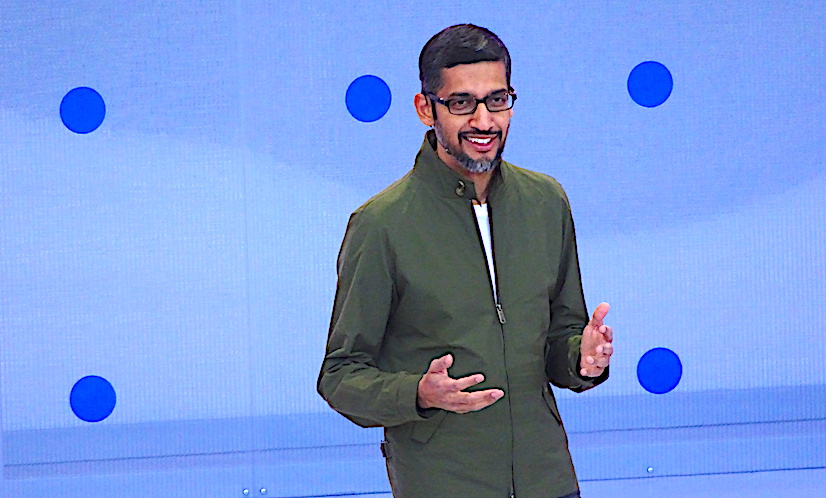 CLOUD
CLOUD
 CLOUD
CLOUD
 CLOUD
CLOUD
To no one’s surprise, Google LLC parent Alphabet Inc. today reported that its advertising business continues to roll, but a $5 billion fine recently imposed by the European Union wiped out a large chunk of its net profit.
Moreover, Google’s “other revenues” besides advertising, the large majority of which are its cloud computing operations as well as its Google Play app and media store and hardware such as smartphones and Home smart speakers, jumped 37 percent, to $4.4 billion, in its second quarter.
Alphabet said it earned a net profit of $3.2 billion, or $4.54 a share, down from $3.5 billion or $5.01 a share a year ago, when Google paid another fine of $2.7 billion. Excluding the fines in both years’ second quarter, net income rose 32 percent, to $8.3 billion, or $11.75 a share.
That was well above analysts’ expectations of a $6.72 billion or $9.66-a-share profit before the fine. The EU fine last week stemmed from charges that it favors its own services on its Android mobile operating system. Google said it plans to appeal but took the charge in the quarter anyway.
Total revenue rose 26 percent, to $32.7 billion, or $29.2 billion after subtracting the costs of acquiring traffic for its search and other services. Wall Street had been forecasting $32.2 billion, or $25.6 billion after subtracting traffic acquisition costs or TAC.
As a result of the clear beat for the quarter, investors were bidding up shares about 4 percent in after-hours trading, suggesting the share price will hit a new record high on Tuesday. Shares rose 1.1 percent today in regular trading, to $1,211, up more than 200 points since early April.
“The consistent strength of GOOG’s top-line is remarkable,” Macquarie Research analyst Ben Schachter wrote in a note to clients. “The bottom line is that GOOG continues to deliver significant growth despite its size, and cloud and its other emerging businesses could be meaningful.”
The results appeared to reveal little impact from the EU’s General Data Protection Regulation that went into effect in early May, limiting the ways companies can use customer data. GDPR has had some effect on some advertising technology firms as companies struggling to comply with the rules may have held off on using some data-intensive ad services.
But for Google, that wasn’t a big issue. Its ad revenues rose 24 percent, to $28.1 billion.
Google still doesn’t disclose its cloud revenue in precise terms, though Chief Executive Sundar Pichai (pictured) revealed early this year that it’s a billion-dollar-a-quarter business. That’s a tiny fraction of Alphabet’s overall revenue, chiefly from advertising on its search service, particularly mobile searches.
Still, by all accounts, cloud revenues are growing fast, and Google is gaining share in a market dominated by Amazon Web Services Inc. and a hard-charging Microsoft Corp. with its Azure and other cloud services. The earnings report comes on the eve of Google’s annual cloud computing conference, Cloud Next, in San Francisco, where it will introduce a range of new services and woo some 20,000 software developers, partners and prospective customers.
“We’re definitely seeing traction” on the cloud, Pichai said on the analyst conference call. With a lot of Google’s effort coming in “go-to-market efforts,” he added, “partnering is beginning to pay dividends.”
Along with the revenue growth is a significant hike in expenses spent to build out its public-cloud operation. “The most sizable and headcount increases were in cloud both for technical and sales roles,” Chief Financial Officer Roth Porat said on the call. Pichai added that “we’re investing for the long run.”
Google Cloud’s growth suggests that there’s still a lot of upside, said Charles King, president and principal analyst at Pund-IT Inc. “The truth is that the cloud marketplace is still in relatively early days and Alphabet has plenty of time and the wherewithal to focus on and execute a long-term strategy.”
Alphabet’s “Other Bets,” which include self-driving car firm Waymo, Fiber, the Nest home devices unit, the healthcare company Verily and other businesses, logged an operating loss of $732 million, up from $633 million a year ago, on revenue of just $145 million, up from $97 million a year ago. Porat said most of the revenue came from Fiber and Verily.
But some areas such as Nest have been a disappointment, according to some observers, but it may be that smart-home products haven’t quite hit the mainstream for most product providers. “It’s worth asking whether the fault was with the optimistic claims about consumers driving IoT rather than business execution issues,” King said.
Capital spending nearly doubled, to $5.48 billion, from last year. The company’s hiring is barreling ahead as well. It now has 89,058 employees, up about 4,000 from the end of March.
In comments on the earnings call, Pichai once again emphasized the commanding role of artificial intelligence and machine learning in nearly all its products, from search to Maps to advertising. “We want Google to be the source when you need something,” he said, and that requires the deeper understanding of search and other queries that machine learning can help provide.
Support our mission to keep content open and free by engaging with theCUBE community. Join theCUBE’s Alumni Trust Network, where technology leaders connect, share intelligence and create opportunities.
Founded by tech visionaries John Furrier and Dave Vellante, SiliconANGLE Media has built a dynamic ecosystem of industry-leading digital media brands that reach 15+ million elite tech professionals. Our new proprietary theCUBE AI Video Cloud is breaking ground in audience interaction, leveraging theCUBEai.com neural network to help technology companies make data-driven decisions and stay at the forefront of industry conversations.